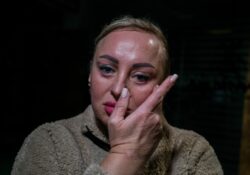Oksana Minenko had her nails torn out, among other abuses, at the hands of Russian soldiers, she claimed (Picture: Reuters)
A Ukrainian woman says she became a ‘living corpse’ after Russian forces reportedly tortured her for months in occupied Kherson.
Oksana Minenko, 44, says Russian soldiers submerged her hands in boiling water, ripped out her fingernails and beat her with rifle buts while she was detained.
‘One pain grew into another,’ Minenko told Reuters in December. ‘I was a living corpse.’
Since the southern region was liberated by Ukraine last November after eight months, a catalogue of atrocities at the hands of Moscow has slowly emerged.
Minenko was among them. She said her husband, a soldier, died on the first day of the invasion.
Soldiers showed up to his funeral and forced Mineko to kneel next to his grave as they fired their automatic weapons in a mock execution, she said.
A downtrodden and soaked LGBTQ+ flag in a basement thought to be a makeshift torture chamber (Picture: Reuters)
One of the alleged sites included a school, with Russian propaganda newspapers left scattered inside (Picture: Reuters)
Prosecutors say the largest site inside an office basement held 30 people in a single room (Picture: Reuters)
Her grief gave way to fear as Russian forces crashed into homes or dragged people off the streets – Ukrainian officials estimate at least 600 people were kidnapped during the occupation, with many more feared missing.
Men in Russian military uniforms and balaclavas broke into Minenko’s home at least three times to interrogate and detain her.
‘When you have a bag on your head and you’re being beaten, there is such a vacuum, you cannot breathe, you cannot do anything, you cannot defend yourself,’ she said.
Dozens of victims, Ukrainian police and prosecutors told Reuters how torture was routine: Russian forces electrocuted people’s genitals and other body parts, pummeled people and suffocated them through various means.
Others were hauled into overcrowded cells with no sanitation, food, water or even sunlight for up to two months.
The sound of men being tortured still haunts Liudmyla Shunkova, 47. ‘They screamed, it was constant, every day. It could last for two or three hours,’ she said.
The torture she suffered is engraved in the mind of Oksana Minenko – and etched, literally, on her body (Picture: Reuters)
A war crime prosecutor inspects a basement of an office building (Picture: Reuters)
Plastic ties for torture and a broken chair are seen inside the basement site (Picture: Reuters)
Andriy, 35, said the jolt of electricity tearing through his genitals was like a ‘ball flying into your head and you pass out’.
Though Reuters said it was unable to verify the victims’ claims, their accounts fit into a pattern of suffering said to be taking place in occupied regions.
Ukrainian officials and survivors have said Russian forces target and torture those they believe to be ‘local patriots or ‘refused to cooperate’ with the occupiers.
They’re taken to underground torture chambers, while witnesses say soldiers strolling down streets suddenly beat people for no real reason.
Detainees have described how their captors often interrogated them about Ukraine’s military, such as where weapons and explosives are stored.
The Kherson region’s chief war crimes prosecutor Andriy Kovalenko said: ‘This was done systematically, exhaustingly.’
Ukrainian prosecutors have received countless reports of war crimes, torture and worse from now-liberated regions (Picture: Reuters)
Another 400 were illegally trapped there, Ukraine’s top war crimes prosecutor, Yuriy Belousov, said. One of the largest was an office building in Kherson city, with more than 30 said to have been crammed into a single basement.
Reuters said that during a December visit to the basement, the ‘smell of human excrement filled the air’.
Belousov added that he has received testimonies of people being forcibly deported to Russian-held territory.
Ukrainian authorities have opened pre-trial investigations involving more than a thousand people in the Kherson region allegedly abducted and illegally detained.
As investigations continue, officials have so far found at least 10 apparent unlawful ‘detainment sites’ where at least 200 people were reportedly tortured.
Nationwide, prosecutors have opened probes into the alleged unlawful detainment of more than 13,200 people.
Oksana Minenko was made to kneel on the grave of her husband as Russian soldiers pretended to shoot, she claimed (Picture: Reuters)
The office site was filled with sacks of human excrement (Picture: Reuters)
Ukrainian authorities have logged more than 50,000 reports of war crimes.
But officials have warned that the true toll is likely far higher, given how long some regions have been occupied.
Russia has long denied committing war crimes in its so-called ‘special military operation’ against Ukraine.
Yet an UN-appointed commission said war crimes have taken place in Russian-occupied regions of Ukraine – including women enduring sexual assault.
As more parts of Ukraine are ripped from the grips of Russian control, a catalogue of physical and emotional abuse is being revealed (Picture: Getty)
The war has raged for nearly a year (Picture: Anadolu)
UN investigators based in Ukraine say they have received countless cases of Russians tormenting civilians – sometimes to the point of death.
Having spoken with more than a thousand victims and witnesses, UN bosses said three Ukrainian men were found dead in a cellar in the capital Kyiv, their hands and legs bound and fingers severed off.
The UN report says: ‘In Kyiv region, in March 2022, two Russian soldiers entered a home, raped a 22-year-old woman several times, committed acts of sexual violence on her husband and forced the couple to have sexual intercourse in their presence.
‘Then, one of the soldiers forced their four-year-old daughter to perform oral sex on him, which is rape.’
Metro.co.uk contacted the Russian government for comment.
Get in touch with our news team by emailing us at [email protected].
For more stories like this, check our news page.
‘I was a living corpse.’





